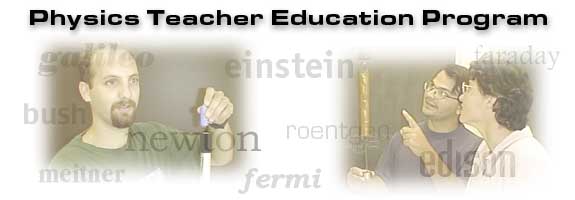

(Under revision; last updated 10/29/2010)
| INDEPENDENT STUDY (MOD - Modeling Method of Physics Instruction) | 1-3 s.h. | Fall/Spring |
This informal optional course allows students to address specialized interests or needs. This variant is suitable for any student who has completed an introductory sequence in physics. Contact program coordinator for details.
Name: Dr. Carl J. Wenning, Physics Education Specialist
Physics Teacher Education Program
Office Location: Moulton Hall, Room 322
Office Hours: drop in or by appointment
Telephones: (309) 438-2957 (office); 830-4085 (cell)
E-mail address: wenning@phy.ilstu.edu
Because this course is an independent study, students will complete work on their own schedule. Students should arrange a mutually agreeable time to meet with the instructor of record as necessary. Most project work will be completed in Moulton Hall, room 307-B. The department generally does not loan out materials for at-home work.
The student will conduct and complete 1 to 3 units/credit hour of Modeling mechanics working independently. It is assumed that the student has sufficient understanding in the area of mechanics (kinematics and dynamics) to complete the required exercises. It is not the intention of this independent study course to provide direct instruction. Students are expected to remediate using their own time, effort, and resources - seeking assistance from the course supervisor as necessary.
The goals of this independent study course are to help the teacher candidate to:
Students are not required to purchase any textbook for this course; students will receive Modeling Instruction guidelines in printed form. Complete resources are available through the Arizona State University Modeling web site (login and password needed for complete access to all Modeling materials).
The student will complete accurately all activities and assessments outlined in each of the units.
Grades will be based on the number of credit hours for which a student is registered. The final course grade will be determined on the basis of the number of satisfactorily completed and scored units (98% minimum score; freely make use of Assessment-for-Learning Policy common to PTE courses) submitted by 4 P.M. on the LAST DAY OF CLASSES - NOT THE LAST DAY OF FINALS WEEK. NO INCOMPLETE GRADES OR TIME EXTENSIONS WILL BE GRANTED. All units must be completed in sequence beginning with Unit 2 - Kinematics; Unit 1 - SCIENTIFIC THINKING - does not count toward the final grade except in the one case noted below. Grades will be assigned on the following basis:
| 3 s.h. | 2 s.h. | 1 s.h. |
|---|---|---|
|
|
|
Students are expected to be honest in all academic work. A student's name on any in academic exercise shall be regarded as assurance that the work is the result of the student's own efforts. Offenses involving academic dishonesty include, but are not limited to, the following: cheating, computer dishonesty, plagiarism, grade falsification, and collusion. For more information about this important topic, visit the Student Dispute Resolution Web site.